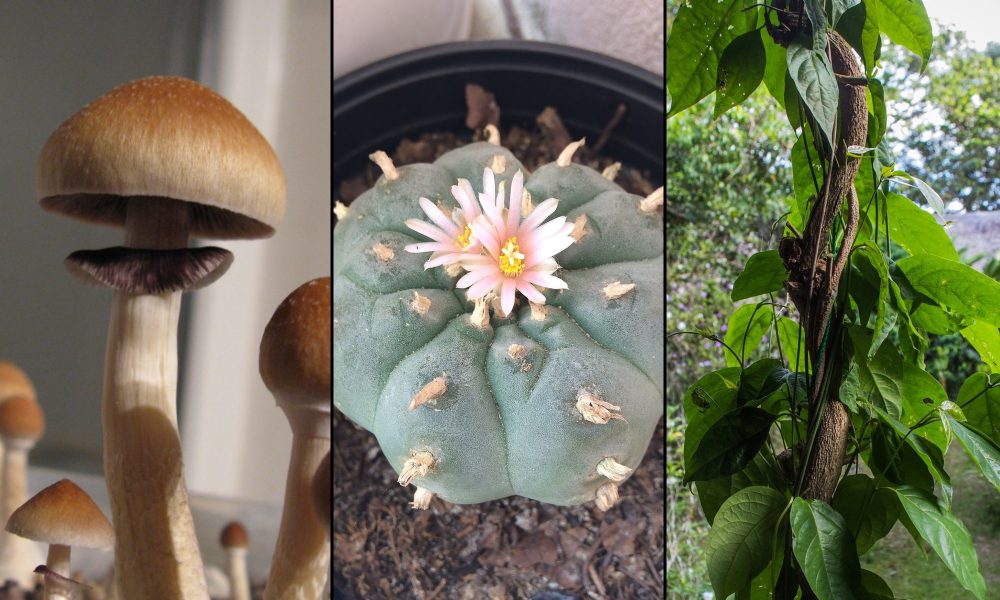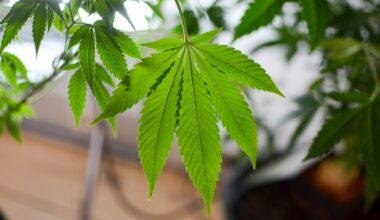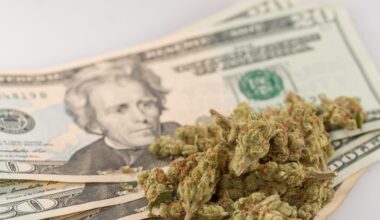The Maryland House of Delegates on Friday gave initial approval to a Senate-passed bill that would create a state fund to provide “cost-free” access to psychedelics like psilocybin, MDMA and ketamine for military veterans suffering from post-traumatic stress disorder (PTSD) and traumatic brain injury.
The legislation from Sen. Sarah Elfreth (D) advanced on a voice vote on second reading one day after the House Appropriations Committee passed it. Assuming that delegates don’t adopt any amendments on a third reading vote, which is expected soon, the bill would then head to the desk of Gov. Larry Hogan (R).
There was no discussion of the bill on the floor on Friday, but Appropriations Committee Chairwoman Maggie McIntosh (D) and other lawmakers did talk about its provisions and potential during Thursday’s panel voting session.
McIntosh said that she’d watched a “60 Minutes” segment featuring military veterans who’d used certain psychedelics to treat symptoms of PTSD and anxiety. She said “it was incredible what the transformation was in the use of these drugs—and it’s giving a lot of people now some real hope that they can actually do treatment.”
Another member said that the alarming rate of veteran suicide is “an issue that has touched all of us, and anything we can do, conventionally or alternatively, we should be doing.”
This latest action also comes days after the Maryland legislature agreed to put marijuana legalization on the state’s November ballot and sent the governor complementary legislation concerning initial rules for the program if voters approve the policy change.
The psychedelics proposal would establish what’s being called the Post-Traumatic Stress Disorder and Traumatic Brain Injury Alternative Therapies Fund. It stipulates that money from that fund must be used to study “the use of alternative therapies for veterans with PTSD and traumatic brain injuries.”
The Appropriations Committee on Monday took testimony on the legislation, with the sponsor pointing to ongoing trials exploring the benefits of psychedelics at Johns Hopkins University, located in Maryland, and other research institutions.
Last month, the panel also considered nearly identical companion legislation sponsored by Del. Seth Howard (R). Members at the time adopted several amendments to more closely align the legislation in both chambers, though that legislative vehicle did not advance ahead of the crossover deadline, with the focus now being on the similar Senate bill.
—
Marijuana Moment is already tracking more than 1,000 cannabis, psychedelics and drug policy bills in state legislatures and Congress this year. Patreon supporters pledging at least $25/month get access to our interactive maps, charts and hearing calendar so they don’t miss any developments.![]()
Learn more about our marijuana bill tracker and become a supporter on Patreon to get access.
—
The bill seeks to provide “cost-free access” to psychedelics for eligible veterans.
The state Department of Health would be required to “periodically” consult with the Department of Veterans Affairs, Johns Hopkins University, the University of Maryland, Sheppard Pratt hospital and the Walter Reed National Military Medical Center.
The purpose of the partnerships would be to determine the “effectiveness of and a method for improving access to alternative therapies for treating” PTSD and traumatic brain injury in veterans. They would also consult on “appropriate uses of the fund that further the fund’s purpose.”
The department would need to first submit a report to the governor and legislation with “initial findings and recommendations” by December 1, 2022. Two years later, there would be another deadline for findings and recommendations that are based on studies that were specifically funded through the PTSD fund.
The recommendations would focus on “budgetary, legislative, or regulatory changes to expand access to alternative therapies for veterans with post–traumatic stress disorder and traumatic brain injuries,” the bill text states.
For fiscal year 2024, the bill calls for the governor to include $1 million in an annual budget bill for the fund.
Maryland is one of numerous states where psychedelics reform is being taken up this session.
For example, a Colorado House committee on Tuesday approved a bill aligning state statute to legalize MDMA prescriptions if and when the federal government ultimately permits such use. However, the House Public & Behavioral Health & Human Services Committee also rejected separate legislation to create a psychedelics review panel to study substances like psilocybin and DMT and issue recommendations on possible policy changes.
Last week, Georgia lawmakers advanced a bipartisan resolution that calls for the formation of a House study committee to investigate the therapeutic potential of psychedelics like psilocybin and make recommendations for reforms.
The governor of Utah last month signed a bill to create a task force to study and make recommendations on the therapeutic potential of psychedelic drugs and possible regulations for their lawful use.
A Missouri House committee also held a hearing last month on a GOP-led bill to legalize a wide range of psychedelics for therapeutic use at designated care facilities while further decriminalizing low-level possession in general.
A Connecticut legislative committee approved a bill last month that would set the state up to provide certain patients with access to psychedelic-assisted treatment with substances like MDMA and psilocybin. Connecticut Gov. Ned Lamont (D) signed a separate bill last year that includes language requiring the state to carry out a study into the therapeutic potential of psilocybin mushrooms. A workgroup has since been meeting to investigate the issue.
The Washington State legislature recently sent a budget bill to the governor’s desk that includes a proposal to direct $200,000 in funding to support a new workgroup to study the possibility of legalizing psilocybin services in the state, including the idea of using current marijuana regulatory systems to track psychedelic mushrooms.
Last month, the Hawaii Senate approved a bill to set up a state working group to study the therapeutic benefits of psilocybin mushrooms and develop a “long-term” plan to ensure that the psychedelic is accessible for medical use for adults 21 and older.
Also last month, the Oklahoma House of Representatives passed a bill to decriminalize low-level possession of psilocybin and promote research into the therapeutic potential of the psychedelic.
Rhode Island lawmakers introduced a pair of drug decriminalization bills last month—including one focused on psilocybin and buprenorphine that would authorize doctors to prescribe the psychedelic mushroom.
An Oregon Senate committee also recently advanced a bill to ensure that equity is built into the state’s historic therapeutic psilocybin program that’s actively being implemented following voter approval in 2020.
A bill to decriminalize a wide array of psychedelics in Virginia was taken up by a House of Delegates panel in January, only to be pushed off until 2023. A separate Senate proposal to decriminalize psilocybin alone was later defeated in a key committee.
California Sen. Scott Wiener (D) told Marijuana Moment in a recent interview that his bill to legalize psychedelics possession stands a 50/50 chance of reaching the governor’s desk this year. It already cleared the full Senate and two Assembly committees during the first half of the two-year session.
Washington State lawmakers also introduced legislation in January that would legalize what the bill calls “supported psilocybin experiences” by adults 21 and older.
Meanwhile, a Pennsylvania bill meant to promote research into the therapeutic potential of psilocybin mushrooms for certain mental health conditions may be in jeopardy, with the sponsor saying that the chair of a key House committee is expressing reservations even after the legislation was amended in an effort to build support.
New Hampshire lawmakers filed measures to decriminalize psilocybin and all drugs.
Legislation was also enacted by the Texas legislature last year requiring the state to study the medical risks and benefits of psilocybin, MDMA and ketamine for military veterans in partnership with Baylor College of Medicine and a military-focused medical center.
At the congressional level, bipartisan lawmakers sent a letter to the Drug Enforcement Administration (DEA) in January, urging that the agency allow terminally ill patients to use psilocybin as an investigational treatment without the fear of federal prosecution.
Feds Clarify That Medical Marijuana Recommendations From Doctors Don’t Excuse Positive Drug Tests
Photo elements courtesy of carlosemmaskype and Apollo.
Medical Disclaimer:
The information provided in these blog posts is intended for general informational and educational purposes only. It is not a substitute for professional medical advice, diagnosis, or treatment. Always seek the advice of your physician or other qualified healthcare provider with any questions you may have regarding a medical condition. The use of any information provided in these blog posts is solely at your own risk. The authors and the website do not recommend or endorse any specific products, treatments, or procedures mentioned. Reliance on any information in these blog posts is solely at your own discretion.







